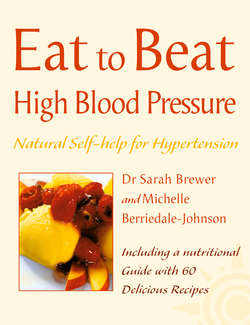Читать книгу High Blood Pressure: Natural Self-help for Hypertension, including 60 recipes - Michelle Berriedale-Johnson - Страница 17
STRESS
ОглавлениеHigh blood pressure is thought to be linked with excessive levels of stress in some people. Susceptible individuals have an overactive part of the nervous system (sympathetic nervous system) which is unusually responsive to stressful stimuli that would normally be associated with only a mild, temporary rise in blood pressure. This overactivity of sympathetic nerves probably runs in families, with stress acting as the environmental factor that triggers off the process.
In people sensitive to stress, a condition known as Gaisbock’s syndrome can occur. This is a form of labile hypertension in which blood pressure levels can vary considerably. Sometimes they are high; sometimes they are low or normal. This can lead to more permanent hypertension if their lifestyle doesn’t slow down. One of the most common signs of this is so-called White Coat Hypertension – blood pressure that shoots up on being measured in the surgery or hospital (usually by someone wearing a white coat or uniform). This can increase systolic BP by as much as 100 mmHg, although this is extreme. More commonly, white coat hypertension increases systolic BP by 20–30 mmHg. This form of hypertension is confirmed by attaching the sufferer to a 24-hour BP monitoring tape and showing that BP rises in stressful conditions, including having BP measured by a doctor, then falls again in between.
Until recently, white coat hypertension was thought to be relatively harmless. However, latest research suggests that people with this condition have just as many abnormalities of the heart and blood vessels (e.g. poor left ventricular function, decreased elasticity and increased stiffness of artery walls) as those with persistently high blood pressure. They are also likely to develop hypertension in the future.
In most people, however, stress only causes only a transient rise in BP as a result of the hormone adrenaline (epinephrine). This triggers the constriction of arteries and veins which temporarily puts blood pressure up. This is an adaptive response to help you fight or flee in dangerous situations. Blood pressure can still fall when you are at rest or asleep, however, and relaxation training is usually helpful in offsetting the effects of excessive stress.
For more information, see Chapter 21.
